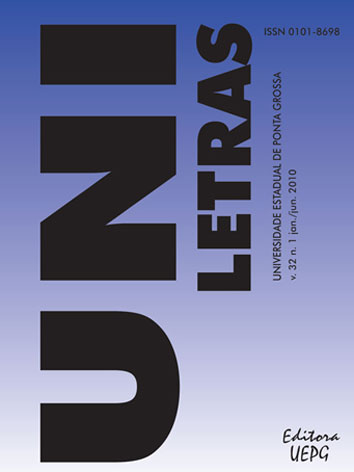“1984” by George Orwell and its fi lm adaptation: artistic statements in times of war
DOI:
https://doi.org/10.5212/uniletras.v32i1.2531Keywords:
1984, George Orwell, Cinema, Compared literature, Artistic representations.Abstract
Among the forms of artistic representation, cinema seems to base itself on three distinctmodels: theatre, for its acting; painting, for the importance of the images; and literature, as a main
source used in its creations. The aim of this article is to compare the dystopian novel 1984 (2005),
written by the English novelist George Orwell and its homonymous fi lm adaptation, produced in
1984. It will demonstrated how the warfare fears that surrounded both productions – in the case of
the literary work, the post-World War II terror; and in the case of the fi lm, the danger of the Cold
War – contributed in the creation process and acceptance of such works. Furthermore, the article
discusses how the movie deals with dream/delusion as a way of escaping from reality, in a different
way from the literary work, and what the effects produced with such modifi cation are, for the fi lm
as well as for the viewing audience.
Keywords: 1984; George Orwell; Cinema; Compared literature; Artistic representations.
Downloads
Downloads
Issue
Section
License
Authors that publish in the journal agree with the following terms:
a) The authors keep the copyright and grant to the journal the rights of the first publication, with the work simultaneously being licensed under the Creative Commons Attribution License that allows the sharing of the work with the recognition both of the authorship and the initial publication in this journal.
b) This journal provides immediate public access to all of its content, following the principle that making scientific knowledge freely available to the public provides greater worldwide democratization of knowledge. For more information about this approach, visit Public Knowledge Project, a Project that developed this system to improve the academic and public quality of research, distributing OJS as well as other softwares to support the publication system to public/open access to academic sources. Names and e-mail addresses in this website will be used exclusively for this journal purposes, not being available for other ends.

This work is licensed under a Creative Commons Attribution 4.0 International License.





